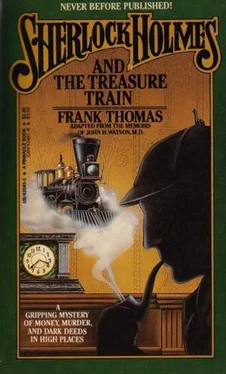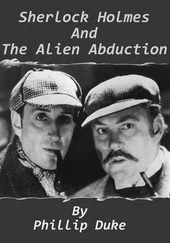"Almont?" I asked with considerable surprise.
"He retired two years ago and came to live here," explained Bennett.
"I didn't know that. Naturally, I've read his articles in Lancet with great interest."
"You were fortunate, Bennett," stated Holmes, "to have one of the foremost pathologists in the world at your beck and call."
"I certainly beckoned," replied Bennett. "When young Charles told me that he had found Ezariah Trelawney with his skull crushed, I hightailed it over here and got Dr. Almont. Then the three of us returned to the Trelawney house. Doctor Almont checked the coagulation of blood on the back of the murdered man's head and tested the rigidity of the body and delivered the opinion that the murder had been committed between eight and ten."
"Almont's opinion would be accepted by any jury. In conjunction with Alexandre Lacassagne of France, he has made considerable contributions to the advancement of forensic medicine." Holmes thought for a moment. "If young Trelawney had just arrived from Hereford, he is in the clear, but I understand the stationmaster contested this."
Bennett nodded. "Pierce is a friend of young Charles, who is well liked by one and all. He saw the boy get off the last carriage of the six o'clock. A redheaded stranger and Charles were the only ones who got off the train. It meant nothing to him at the time, but at the inquest he had to tell what he had seen."
"Unwillingly," said Holmes. "That lends all the more credence to his words. Perhaps you had better relate what occurred, Bennett."
The constable's eyes narrowed, as though he did not wish to overlook a single fact. "Charles was in a state of semi-shock, but after discovering the body, he had the presence of mind to close the door to the study before leaving the house. As I mentioned, the three of us returned there promptly. Upon opening the study door, we found everything as Charles had hastily related to me. Ezariah Trelawney was slumped in his chair in front of the fireplace. The right side of his skull was a sight indeed."
"The back of the skull, according to the newspapers," mentioned Holmes.
"'Twas the back that got hit, but on the right side."
I shifted impatiently in my chair for it seemed they were splitting hairs. "And the dog, Lama? He was still in the room?"
This point seemed of special interest to Holmes.
"Yes, sir," responded Bennett. "When Charles closed the door behind him, how could the little fellow get out?"
"That is my point, or at least a point of puzzlement." My friend chewed reflectively on a piece of beef. "Charles Trelawney testified that when he returned to his home, he found the door to the study closed. For his own sake, he might have said that the door was open. Had this been the case, the possibility could have existed that the dog was in some other part of the house when the fatal blow was struck."
"That bothered me also," replied the constable.
"Another thought," continued Holmes. "From your description and that in the papers, Trelawney's skull had been shattered from behind very severely. Would not a blow of such strength have driven the body from the chair?"
"Not necessarily," I stated automatically. "It was mentioned that the corpse was well beyond the three score and ten. At that age, bones tend to become more fragile. The blow need not have been delivered with great strength."
"A good point, my dear Watson."
Bennett continued: "Whatever the weapon was, we did not find it. After inspecting the wound in greater detail, Dr. Almont delivered the opinion that it was caused by a club or stave perhaps, but definitely of wood. Lama was very nervous and whining, but Charles was able to quiet him. A book was on the floor, open, as though it had fallen from Ezariah's hands."
"Which it probably had," reflected Holmes. "There was a half-consumed cigar in a tray by the chair. I believe that it was in the tray and lit when Ezariah was killed. It looked like it had gone out of its own volition."
"Now that is interesting," said Holmes. "I should have guessed the victim was a smoker since he made you a gift of a cigar."
"'Twas the same type that I'm smoking right now," replied Bennett. "Ezariah had them sent to him from Amsterdam, as you divined, Mr. Holmes."
"What else can you tell us, Bennett?" asked Holmes.
"Well, sir, the maid and cook had left at seven, and a number of people saw them crossing the town square at that time. They both have families who testified that they returned home at their regular time and stayed there the entire night."
"So," said the great detective, "the murdered man was alone and someone, anyone, could have entered the house."
"For a fact," agreed Bennett. "We don't lock doors in Shaw since crime, as such, really doesn't exist. Oh, occasionally a couple of sheep are missing but they always turn up. After payday, a few of our local cutups drain the bottle too deep and I have to make motions like a policeman, but that's about the whole of it. Until now," he added.
"But it was not always thus," prompted Holmes.
"Well, sir, now we go back a ways, long before my time. It was in the days of Monks Holes and the religious wars, and this was not the peaceful countryside it is now. Ezariah Trelawney was childless and adopted Charles, who was a foundling. There is another resident, Horace Ledbetter, who has a farm on the outskirts. He is the last of his family as well. He has a niece, Agnes Bisbee, who lives with him, but she is the daughter of his dead wife's sister and no blood kin. The local feed-and-grain store belongs to Vincent Staley, who never did marry. 'Tis said he has some relatives in Lancashire, but I don't know that for a fact. But it is a fact that at one time all three of the families were large ones and owned a lot of the land in these parts. It is hard to put a finger on what started it all. Some say that one of the Staleys was a wild lad with a taste for liquor and an eye for the lassies. He was supposed to have been riding through the countryside and come upon one of the Ledbetter girls and had his way with her. The next thing was the Staley estate was attacked in force by the Ledbetters and it was a pitching battle with a lot of bodies that never rose again. How the Trelawneys got into it is a mite vague. One story is that the oldest Trelawney tried to make peace between the two families and was cut down by mistake. Whatever the reasons, the three families went after each other with a vengeance. 'Twas like one of those Scottish feuds one hears of that went on so long that the original cause is unknown."
Holmes' lips were forming a comment when I advanced an opinion. "Possibly, you are referring to the Sutherland-Mackaye feud, which continued for seven hundred years. However, the cause is known. The two clans went to war due to an argument as to which one had been appointed by the king to defend the north against the Dane. This local bloodletting sounds more like the Hatfield-McCoy affair, which occurred in the southern United States. Or perhaps the Lincoln County war, which was in the American West." I noted that both Bennett and Holmes were staring at me in surprise as I amended my last statement. "No, the Lincoln County cattle war was of far shorter duration than the conflict you describe. However, it did produce William Bonney, known as Billy the Kid."
Holmes' eyes seemed almost glazed. "Watson, I never dreamed you were such a fount of wisdom regarding feuds and family strife."
"Well . . . I . . . it just happened to be a subject that interested me at one time," I stammered, somewhat embarrassed.
"Obviously," commented Constable Bennett. "In any case, the Trelawneys and the Ledbetters and the Staleys had a real go at it and the war continued from father to son. When law finally came, it was not a case of their drawing swords on sight, but there were a lot of disappearances and unusual deaths. Finally, they whittled each other down so much there was not enough left to fight. But it is a fact that Ezariah Trelawney, Horace Ledbetter, and Vincent Staley hated each other from childhood and their feeling did not mellow with the coming of age."
Читать дальше












